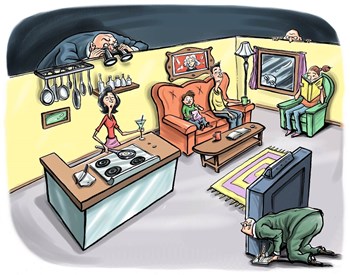
Home-Owners’ Associations – are the bane of almost everyone. None of the Owners in an Association, who are not on its Board, like it. Those who are on a HOA Board, typically can’t wait to get off of it.
Except the Neighborhood NIMBY. You know who I mean… the one using Gestapo-esqe methods of peeking through windows to see who is violating Rule 3, subsection 17, part 3. This one wants to issue fines against almost everyone, and is never satisfied.
The NN will yell that a co-owner can’t have a built in BBQ, or different color window shades, or potted plants over a certain size on a balcony. And it’s typically against the Neighbor NIMBY that others claim the most violations. The Rules, it appears, don’t apply to him/her.
But, the Rules? Oh, trust me, the NN knows the Rules. Backwards and forwards, and upside down; and even if written in Sanscrit.
It’s enough to give anyone a headache.
Now imagine that there are a lot of NN’s in the ‘hood. And that they don’t want those pesty “Air BnB” or “short term rentals” next door.
So, they read the Rules, and see that to change the CC&Rs (because there are no prohibitions against STRs in the CC&Rs), they need a “super majority” of voters to vote to amend the CC&Rs. (The case did not say what the “super majority” needed was – they are typically a 2/3 vote, but can be 75%). And they hold a vote. But don’t get enough votes! They only get 62%. The Air BnB’ers rejoice. (After all, some bought the condos specifically to Air BnB them out.)
What do the NNs do now?
They file a petition to the courts (Orchard Estate Homes v Orchard Homeowner Alliance) and ask that the court say that the 62% was enough after all. Close, it appears, is good for something other than merely hand grenades!
CA Civil Code § 4275 says that a HOA can ask the court to approve a HOA vote to change CC&Rs if there are less than a super majority, but still more than 50% voting in favor.
The statute reads, in part:
“The purpose of [the statute] is to provide homeowners associations with the ability to amend [their] governing documents when, because of voter apathy or other reasons, important amendments cannot be approved by the normal procedures…”.
In this case, there were 93 homeowners, and 85 voted. Only 8 did not vote – over 91% DID vote. 58 voted to eliminate STRs.
The NN’s didn’t like it that they failed to meet the super-majority threshold. And didn’t want to take “no” for an answer.
They petitioned for AND got the amendment they wanted from the court – using CC § 4275 as a technicality and the basis for their claim.
Now it was time for the Air BnB-ers to gripe. They appealed.
‘Hold on,’ they said. ‘91% voter turnout is NOT “voter apathy.” The HOA simply did not meet the burden, they didn’t get enough votes. They’re just sore losers.’
The court of appeals DENIED the Air BnB-ers’ appeal.
Why? The “other part” of the statute (CC § 4275) set out 4 or 5 different criteria that had to be met to use it – to get a change passed even with less than a super-majority. And, those criteria did NOT include a need to show “voter apathy.” That wasn’t, the appellate court said, one of the 4 or 5 criteria.
The HOA was able to do an end-around and get the CC&R amendment passed, without a super-majority.
Bad decision? I think so.
HOAs are governed by CC&Rs, and those CC&Rs have to apply to everyone equally. If you want to change them, then you have to do it “by the book.” CC § 4275 is supposed to give a HOA the room to make a change if there isn’t enough interest by the homeowners and the change is important and reasonable. But there has to be that lack of interest. To me, when the statute says its “purpose” is to provide that mechanism, then I think the clause relating to the purpose (i.e. voter apathy) needs to exist as a prerequisite to using the statute.
What the court did here was give a HOA the ability to have the court second guess the homeowners’ and put its judgment in front of theirs. If a super-majority is needed, then a super-majority is needed. A single judge is not a super-majority. If the HOA can’t marshal up enough votes to get what it wants, then it should pack its bags and go home.
This election got 91% of the homeowners to show up and vote. That’s NOT apathy. That’s just a good old every day loss at the polls for the Neighborhood NIMBYs.
So I guess we should all read the statute’s phrase “or other reasons” to mean: “when the losers don’t like it.”
I call BS on this decision.
